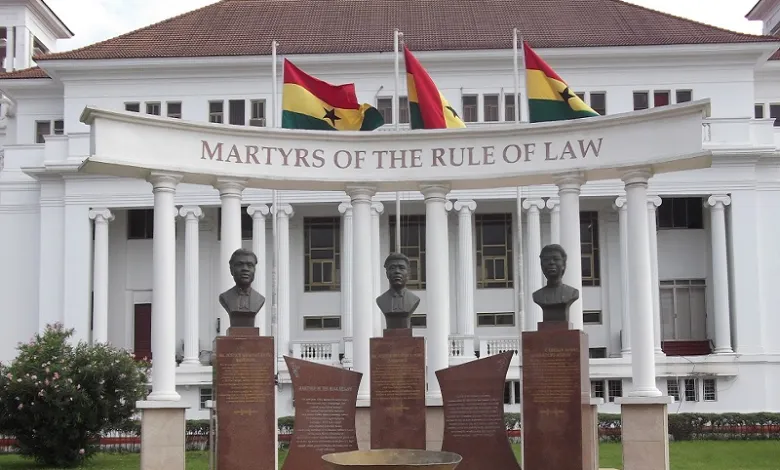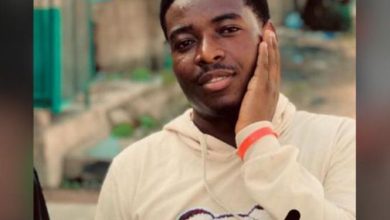Supreme Court: Recommendation to pay salaries to First, and Second Ladies unconstitutional

A seven-member Supreme Court panel presided over by the Chief Justice, Justice Gertrude Torkornoo has by unanimous decision declared as unconstitutional the recommendation by the Professor Yaa Ntiamoa-Baidu Committee salaries to be paid to the First and Second Ladies of the Republic.
The Supreme Court panel apart from the Chief Justice, Justice Gertrude Torkornoo, also included Justices Gabriel Pwamang, Avril Lovelace Johnson, Henrietta Mensa-Bonsu, Barbara Ackah-Yensu, Samuel Asiedu, and Ernest Gaewu.
The apex court essentially held that to the extent that the first and second ladies of the Republic are not Article 71 office holders in the country, they are not entitled to be paid salaries nor ex-gratia by the state.
The Professor Yaa Ntiamoa-Baidu Committee submitted the report of its recommendations, dated 18 June 2020, to President Akufo-Addo as required by the 1992 constitution.
This was in fulfillment of the Article 71 provision of the 1992 constitution which enjoins every sitting president to set up a committee before the end of his or her four-year mandate to make recommendations on emoluments for Article 71 office-holders.
The five-member committee’s report recommended, among other things, the payment of a salary equivalent to a cabinet minister who is a member of Parliament to the First Lady while her husband is in office, and the payment of a salary equivalent to 80% of the salary of a minister of state who is an MP if the spouse served one full term as president, or 100% of the salary of a minister of state who is an MP if the spouse served two or more full terms as president.
Concerning the Second Lady, the committee report recommended the payment of a salary equivalent to a cabinet minister who is not a Member of Parliament to a second lady while her husband is in office and, once he leaves office, the payment of a salary equivalent to 80% of the salary of a minister of state who is not an MP if the spouse served one full term as vice-president or 100% of the salary of a minister of state who is a member of Parliament if the spouse served two or more full terms as vice-president.
The reliefs sought (Abronye)
Two Members of Parliament (MPs), Dafeamekpor Rockson-Nelson, Dr Clement Abaasinat Apaak, and a citizen, Frederick Nii Commey, displeased with the recommendations of the committee, proceeded to the Supreme Court to seek a total of seven reliefs from the Supreme Court. Kwame Baffoe Abronye, a member of the New Patriotic Party (NPP), also filed a similar application in which he also sought four reliefs.
The reliefs sought by Kwame Baffoe Abronye were first, a declaration that the approval by Parliament to pay salaries to the First and Second Ladies is inconsistent with Article 71 Causes 1 and 2 of the 1992 Constitution of the Republic of Ghana and consequently be declared null, void, and unenforceable.
Second, a declaration that per Article 71 (10 and (2); the positions of the First and Second ladies of Ghana do not fall under the category of Public Office holders and third, a declaration that per Article 71 of the 1992 Constitution of the Republic of Ghana; the Emolument Committee is limited to recommending the salaries and other benefits and privileges of only public office holders.
Lastly, a declaration that per Articles 108 and 178 of the 1992 Constitution of the Republic of Ghana, Parliament cannot, on its own accord, initiate or approve payment of any such emoluments; which would necessarily be paid from public funds; without a bill to that effect emanating from and introduced by the Government and duly passed into law.
The reliefs sought (Rockson-Nelson)
Dafeamekpor Rockson-Nelson, Dr Clement Abaasinat Apaak, and Frederick Nii Commey also sought the following reliefs; “first, “a declaration that upon a true and proper interpretation of Article 71(1) of the 1992 Constitution of Ghana, the Prof. Ntiamoah-Badu Committee appointed by the president of the Republic of Ghana under Article 71(1), only had jurisdiction to make recommendations in respect of salaries, allowances payable, facilities and privileges of Article 71 office holders under the Constitution.
Second, “a further declaration that upon a true and proper interpretation of Article 71(1) of the 1992 Constitution of Ghana, the Prof Ntiamoah-Badu Committee had o jurisdiction, mandate or authority to make any recommendations in respect of salaries, allowances payable, facilities and privileges of persons other than persons specified under Article 71 of the Constitution.
Third, “a declaration that upon a true and proper interpretation of Article 71(1) of the 1992 Constitution, the Prof Ntiamoah-Badu Committee exceeded its jurisdiction, mandate, and authority when it purported to make recommendations in respect of privileges, facilities, salaries and allowances payable to the 1st and 2nd ladies of Ghana.
Fourth, “a further declaration that the recommendations of the Committee, to the extent that it pertains to the 1st and 2nd ladies of the Republic, are null, void and of no effect and fifth, “a declaration that upon a true and proper interpretation of the Constitution, 1992, spouses of the President and the Vice President are not Article 71 office holders for receipt of wages and emoluments.
Sixth, “an order declaring the recommendations in respect of privileges, facilities, salaries and allowances payable to the 1st and 2nd ladies of the Republic as unconstitutional and void and lastly, “an order restraining the President of the Republic or any other arm, ministry, department, or agency of the executive from implementing any recommendations of the Prof Ntiamoah Committee which pertains to the 1st and 2nd Ladies of the Republic.”
By court
The Supreme Court on the reliefs sought by Kwame Baffoe Abronye, granted the first, second, and third but denied the fourth relief sought by the applicant. On the reliefs prayed for by Dafeamekpor Rockson-Nelson, Dr Clement Abaasinat Apaak, and Frederick Nii Commey, the Supreme Court denied all of them except the fifth relief, “a declaration that upon a true and proper interpretation of the Constitution, 1992, spouses of the President and the Vice President are not Article 71 office holders for receipt of wages and emoluments,” which was granted by the country’s top court.




